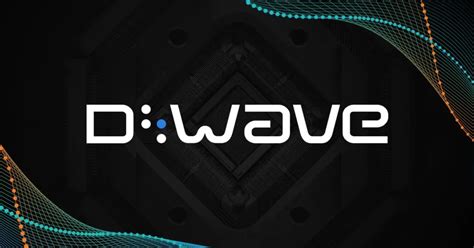
D-Wave Quantum Inc. (QBTS) witnessed a dramatic surge in its stock price, fueled by the announcement of a significant upgrade to its quantum computing systems, specifically its Advantage2 platform. This advancement promises enhanced qubit connectivity and performance, sparking investor optimism about the company’s competitive edge in the burgeoning quantum computing sector.
D-Wave’s stock price skyrocketed, reflecting strong market confidence in the potential of the Advantage2 upgrade to unlock new applications and revenue streams. The company, a leading provider of quantum computing systems, software, and services, is positioning itself at the forefront of the quantum revolution, aiming to deliver practical quantum solutions to businesses and researchers. The stock surge signals that investors see this upgrade as a pivotal step in realizing the commercial potential of quantum computing.
The Advantage2 upgrade represents a substantial leap in D-Wave’s quantum computing capabilities. The upgraded system boasts increased qubit connectivity, a crucial factor in enabling more complex and sophisticated quantum computations. Qubit connectivity refers to the ability of qubits to interact with each other, and higher connectivity allows for the execution of more intricate quantum algorithms. This enhanced connectivity, coupled with performance improvements, allows D-Wave’s systems to tackle larger and more complex optimization problems, potentially leading to breakthroughs in various fields such as logistics, materials science, and drug discovery.
“Advantage2 is the most performant, commercially available quantum computer in the world,” said Dr. Alan Baratz, CEO of D-Wave Quantum, highlighting the significance of the upgrade. This claim reinforces the company’s commitment to pushing the boundaries of quantum computing technology and delivering tangible value to its customers.
The market’s positive response to the Advantage2 upgrade reflects the growing recognition of quantum computing as a transformative technology. As quantum computers mature and become more accessible, they are expected to revolutionize numerous industries by solving problems that are currently intractable for classical computers. D-Wave’s advancements are contributing to this evolution, paving the way for the widespread adoption of quantum computing in the future.
Deeper Dive into the Advantage2 Upgrade
The Advantage2 quantum computing platform is built upon the principles of quantum annealing, a specialized approach to quantum computation that excels at solving optimization problems. Optimization problems involve finding the best possible solution from a vast set of possibilities, and they arise in a wide range of applications, from optimizing supply chains to designing new materials.
D-Wave’s quantum annealers leverage the quantum phenomenon of superposition and tunneling to explore the solution space more efficiently than classical algorithms. Superposition allows qubits to exist in multiple states simultaneously, while tunneling enables them to bypass energy barriers that would trap classical algorithms. By harnessing these quantum effects, D-Wave’s systems can potentially find optimal or near-optimal solutions to complex optimization problems much faster than classical computers.
The Advantage2 upgrade includes several key enhancements that contribute to its improved performance:
-
Increased Qubit Count: While D-Wave has not released the precise qubit count for the upgraded Advantage2, it is understood to be a substantial increase over previous generations. A higher qubit count allows for the encoding of larger and more complex problems, expanding the range of applications that can be addressed.
-
Enhanced Qubit Connectivity: The upgraded system features significantly improved qubit connectivity, enabling each qubit to interact with a greater number of neighboring qubits. This increased connectivity facilitates the implementation of more sophisticated quantum algorithms and allows for the efficient encoding of complex problem structures. This connectivity is crucial for solving real-world problems that often involve intricate relationships between variables.
-
Lower Noise Levels: Quantum computers are susceptible to noise, which can disrupt the delicate quantum states of qubits and lead to errors in computation. The Advantage2 upgrade incorporates advanced noise-reduction techniques to minimize the impact of noise and improve the accuracy of quantum computations. Lower noise levels translate to more reliable and consistent results, enhancing the practicality of D-Wave’s systems for real-world applications.
-
Improved Control and Calibration: Precise control and calibration of qubits are essential for achieving high-performance quantum computation. The Advantage2 upgrade features enhanced control and calibration mechanisms that enable more accurate manipulation of qubits, leading to improved computational accuracy and efficiency.
Implications for Industries and Applications
The Advantage2 upgrade holds significant implications for various industries and applications that rely on solving complex optimization problems. Some key areas that could benefit from D-Wave’s advancements include:
-
Logistics and Supply Chain Management: Optimizing logistics and supply chains involves finding the most efficient routes, schedules, and resource allocations to minimize costs and maximize efficiency. D-Wave’s quantum annealers can be used to solve complex routing problems, optimize warehouse layouts, and improve inventory management, leading to significant cost savings and improved service levels.
-
Materials Science: Designing new materials with specific properties requires exploring a vast space of possible chemical compositions and atomic structures. D-Wave’s quantum computers can be used to simulate the behavior of materials at the atomic level, accelerating the discovery of new materials with enhanced properties, such as strength, conductivity, and thermal stability.
-
Drug Discovery: The process of discovering new drugs is often time-consuming and expensive. D-Wave’s quantum annealers can be used to accelerate drug discovery by simulating the interactions between drug molecules and target proteins, identifying promising drug candidates, and optimizing drug design.
-
Financial Modeling: Financial institutions rely on complex models to assess risk, manage portfolios, and make investment decisions. D-Wave’s quantum computers can be used to improve the accuracy and efficiency of financial models, leading to better risk management and more informed investment decisions. Quantum machine learning algorithms can also be implemented on these systems.
-
Artificial Intelligence and Machine Learning: Quantum machine learning is an emerging field that combines quantum computing with machine learning techniques to develop more powerful and efficient AI algorithms. D-Wave’s quantum annealers can be used to train quantum machine learning models, potentially leading to breakthroughs in areas such as image recognition, natural language processing, and predictive analytics.
Competitive Landscape and Market Positioning
D-Wave operates in a highly competitive quantum computing market, facing competition from both established technology companies and emerging startups. Key competitors include:
-
IBM: IBM is developing gate-based quantum computers based on superconducting qubits. Gate-based quantum computers are more versatile than quantum annealers, but they are also more challenging to build and scale.
-
Google: Google is also developing gate-based quantum computers based on superconducting qubits. Google has demonstrated quantum supremacy, achieving a computational task that is intractable for classical computers.
-
Microsoft: Microsoft is developing a full-stack quantum computing platform, including hardware, software, and cloud services. Microsoft is pursuing both topological qubits and gate-based quantum computing approaches.
-
Rigetti Computing: Rigetti Computing is a startup developing gate-based quantum computers based on superconducting qubits.
-
IonQ: IonQ is a startup developing gate-based quantum computers based on trapped ions.
D-Wave differentiates itself from its competitors by focusing on quantum annealing and delivering practical quantum solutions to businesses and researchers. The company’s Advantage2 upgrade strengthens its competitive position by providing a more powerful and versatile quantum annealing platform. However, D-Wave faces the challenge of demonstrating the superiority of quantum annealing over gate-based quantum computing for a wider range of applications.
Challenges and Future Outlook
Despite the recent stock surge and the promising advancements in its technology, D-Wave faces several challenges in the quantum computing market:
-
Scalability: Scaling up quantum computers to the point where they can solve truly complex problems remains a significant challenge. Building and maintaining large-scale quantum systems with high qubit coherence and low error rates is technically demanding.
-
Error Correction: Quantum computers are susceptible to errors, which can limit the accuracy and reliability of computations. Developing effective quantum error correction techniques is crucial for building fault-tolerant quantum computers.
-
Software and Algorithms: Developing quantum algorithms and software that can effectively utilize the power of quantum computers is essential for unlocking their full potential. A shortage of skilled quantum programmers and developers is a barrier to the widespread adoption of quantum computing.
-
Market Adoption: Convincing businesses and researchers to adopt quantum computing requires demonstrating the clear benefits and value of the technology. Overcoming skepticism and educating potential users about the capabilities and limitations of quantum computers is important for driving market adoption.
Despite these challenges, the future outlook for D-Wave and the quantum computing industry as a whole is positive. As quantum technology matures and becomes more accessible, it is expected to revolutionize numerous industries and solve some of the world’s most challenging problems. D-Wave’s continued innovation and its focus on delivering practical quantum solutions position it well to capitalize on the growing demand for quantum computing services.
D-Wave continues to push the boundaries of what’s possible with quantum annealing, aiming to bridge the gap between theoretical potential and real-world applications. The Advantage2 upgrade, with its enhanced qubit connectivity and performance, represents a significant step forward in this direction. The company’s success will depend on its ability to address the remaining technical challenges, develop compelling use cases, and effectively communicate the value proposition of quantum annealing to potential customers. The current market response indicates a strong belief in D-Wave’s vision and its potential to lead the quantum revolution. The stock surge, driven by the Advantage2 upgrade, underscores the increasing investor confidence in quantum computing as a viable and transformative technology.
Quotes from the Source Article:
- “Advantage2 is the most performant, commercially available quantum computer in the world,” – Dr. Alan Baratz, CEO of D-Wave Quantum.
Frequently Asked Questions (FAQ)
1. What is Quantum Computing and how does it differ from classical computing?
Quantum computing is a type of computation that harnesses the principles of quantum mechanics, such as superposition and entanglement, to solve complex problems that are intractable for classical computers. Classical computers use bits to represent information as either 0 or 1, while quantum computers use qubits. Qubits can exist in a superposition of states, meaning they can be 0, 1, or both simultaneously. This allows quantum computers to explore multiple possibilities concurrently, potentially leading to exponential speedups for certain types of calculations. Entanglement is another quantum phenomenon where two or more qubits become linked together in such a way that the state of one qubit instantly influences the state of the other, regardless of the distance separating them. This allows quantum computers to perform computations in a fundamentally different way than classical computers. The key difference lies in their ability to handle complexity. Quantum computers are not designed to replace classical computers for everyday tasks; rather, they are intended for specific types of problems that are currently impossible to solve efficiently with classical algorithms.
2. What is Quantum Annealing and how does D-Wave’s technology utilize it?
Quantum annealing is a specific approach to quantum computation that is particularly well-suited for solving optimization problems. Optimization problems involve finding the best possible solution from a vast set of possibilities. D-Wave’s quantum computers are based on quantum annealing. They utilize the quantum effects of superposition and tunneling to efficiently search for the optimal solution to an optimization problem. In quantum annealing, the problem is encoded into the system’s energy landscape, and the system is then allowed to evolve to its lowest energy state, which corresponds to the optimal solution. D-Wave’s systems are designed to tackle complex optimization challenges across various industries, including logistics, finance, and materials science. While gate-based quantum computers are more versatile and theoretically capable of running any quantum algorithm, quantum annealers are specialized for optimization and can potentially outperform classical algorithms for certain types of optimization problems. D-Wave’s strategy focuses on delivering practical quantum solutions for optimization, aiming to demonstrate the real-world benefits of quantum annealing in commercial applications.
3. What are the potential applications of D-Wave’s Advantage2 quantum computing platform?
The Advantage2 quantum computing platform has the potential to revolutionize various industries by providing solutions to complex optimization problems that are currently intractable for classical computers. Some key applications include:
-
Logistics and Supply Chain Management: Optimizing delivery routes, warehouse layouts, and inventory management to minimize costs and improve efficiency.
-
Materials Science: Discovering new materials with enhanced properties, such as strength, conductivity, and thermal stability, by simulating the behavior of materials at the atomic level.
-
Drug Discovery: Accelerating the identification of promising drug candidates and optimizing drug design by simulating the interactions between drug molecules and target proteins.
-
Financial Modeling: Improving the accuracy and efficiency of financial models for risk assessment, portfolio management, and investment decisions.
-
Artificial Intelligence and Machine Learning: Training quantum machine learning models for applications such as image recognition, natural language processing, and predictive analytics.
-
Manufacturing: Optimizing production schedules, resource allocation, and process parameters to improve efficiency and reduce waste.
These are just a few examples, and the potential applications of quantum computing are constantly expanding as the technology matures. The Advantage2 platform’s enhanced qubit connectivity and performance enable it to tackle larger and more complex problems, opening up new possibilities for innovation across various sectors.
4. What are the main competitors of D-Wave in the quantum computing market?
D-Wave operates in a highly competitive quantum computing market, facing competition from both established technology companies and emerging startups. Some of its main competitors include:
-
IBM: IBM is developing gate-based quantum computers based on superconducting qubits and offers cloud-based access to its quantum systems.
-
Google: Google is also developing gate-based quantum computers based on superconducting qubits and has demonstrated quantum supremacy.
-
Microsoft: Microsoft is developing a full-stack quantum computing platform, including hardware, software, and cloud services, and is pursuing both topological qubits and gate-based quantum computing approaches.
-
Rigetti Computing: Rigetti Computing is a startup developing gate-based quantum computers based on superconducting qubits and provides cloud-based access to its systems.
-
IonQ: IonQ is a startup developing gate-based quantum computers based on trapped ions, which offer high qubit fidelity and coherence.
D-Wave differentiates itself from these competitors by focusing on quantum annealing and delivering practical quantum solutions to businesses and researchers. While gate-based quantum computers are more versatile, D-Wave’s quantum annealers are specialized for optimization problems and may offer advantages for certain types of applications. The company’s Advantage2 upgrade strengthens its competitive position by providing a more powerful and versatile quantum annealing platform.
5. What are the key challenges and future prospects for D-Wave and the broader quantum computing industry?
D-Wave and the broader quantum computing industry face several key challenges:
-
Scalability: Building and maintaining large-scale quantum systems with high qubit coherence and low error rates is technically demanding. Scaling up quantum computers to the point where they can solve truly complex problems remains a significant hurdle.
-
Error Correction: Quantum computers are susceptible to errors, which can limit the accuracy and reliability of computations. Developing effective quantum error correction techniques is crucial for building fault-tolerant quantum computers.
-
Software and Algorithms: Developing quantum algorithms and software that can effectively utilize the power of quantum computers is essential for unlocking their full potential. A shortage of skilled quantum programmers and developers is a barrier to the widespread adoption of quantum computing.
-
Market Adoption: Convincing businesses and researchers to adopt quantum computing requires demonstrating the clear benefits and value of the technology. Overcoming skepticism and educating potential users about the capabilities and limitations of quantum computers is important for driving market adoption.
Despite these challenges, the future prospects for D-Wave and the quantum computing industry are promising. As quantum technology matures and becomes more accessible, it is expected to revolutionize numerous industries and solve some of the world’s most challenging problems. Continued innovation, development of practical applications, and addressing the technical and market challenges will be crucial for realizing the full potential of quantum computing. The increasing investment in quantum computing research and development from both public and private sectors suggests a strong belief in the long-term potential of this technology.









